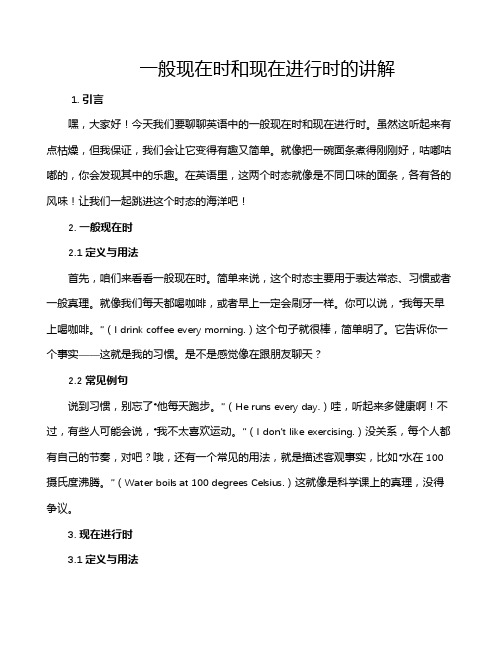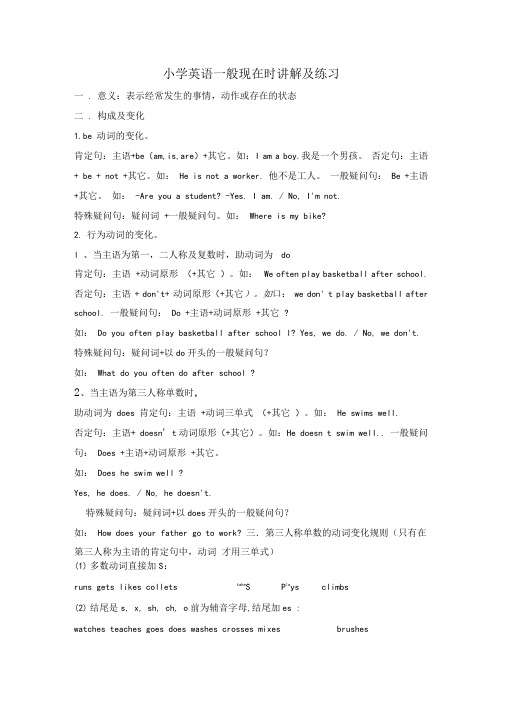一般现在时和现在进行时练习题说课讲解
(完整版)初中语法一般现在时和现在进行时讲解、练习含答案

一般现在时:一、定义与讲解:一般现在时表示经常或习惯性的动作或一般性事实。
,也可表示现在的状态或主语具备的性格和能力。
通常与副词every day(每天),always(总是),usually(通常),often (经常)sometimes(有时),等时间状语连用。
例:(1)表示事物或人物的特征、状态。
The sky is blue.天空是蓝色的。
Mary’s father is an English teacher. 玛丽的爸爸是一名英语老师。
(2)表示经常性或习惯性的动作。
I get up at six every day.我每天六点起床。
She plays sports every day. 她每天都做运动。
(3)表示客观现实。
The table has four legs.桌子有四条腿。
There are 50 students in my class. 我们班有50个学生。
(4)表示客观真理,科学原理,自然现象,等客观事实或格言谚语等。
The sun rises in the east every day.太阳每天从东方升起。
The earth goes around the sun.地球绕着太阳转。
(5)表示平日的喜好。
I like bananas. We don’t like vegetables.He likes ice cream. She doesn’t like strawberries.二.只有主语在第三人称单数时用动词的“三单形式”,其他人称用动词原形。
★动词三单形式的变化规则:1.(1)多数直接在动词词尾加-s.play — plays like — likesask---asks work---works get---gets call---calls(2)以字母s, x, ch, sh或o结尾的动词,在词尾直接加-es.watch---watches wish---wishes do---does go---goes (3)以“辅音字母加 - y”结尾的动词,要先变y为i再加-es.try---tries study---studies cry---cries fly---flies2.不规则变化:be---- is have----has三、一般现在时的句子转换:(1)变一般疑问句:当句子中有be动词或情态动词时,则把be动词或情态动词(can,could等)提到主语的前面,(口诀:一调二变三问号);(2)变否定句:在be动词或情态动词后面直接加not变成否定句. (be后not 莫忘记)例:①陈述句:She is my sister..疑问句→ Is she your sister? Yes, I am./ No, I’m not.否定句→ She is not my sister.②陈述句:I can play soccer.疑问句→ Can you play soccer? Yes,Ican./ No, I can’t.否定句→ I can not /can’t play soccer.★注意:对一般疑问句的回答:一般用什么问就用什么来回答。
一般现在时VS现在进行时复习课教案

一般现在时VS现在进行时复习课教案一、教学目标:1. 让学生理解和掌握一般现在时和现在进行时的用法。
2. 培养学生运用一般现在时和现在进行时进行交际的能力。
3. 提高学生对英语时态的认知和运用能力。
二、教学内容:1. 一般现在时的用法:表示经常性、习惯性的动作或状态。
2. 现在进行时的用法:表示正在进行的动作或当前的状态。
三、教学重点和难点:1. 一般现在时的构成:主语+动词原形。
2. 现在进行时的构成:主语+be动词+动词ing形式。
3. 区分一般现在时和现在进行时的用法和情境。
四、教学方法:1. 任务型教学法:通过完成各种任务,让学生在实际操作中学习和运用语言。
2. 情境教学法:创设各种情境,让学生在真实的语境中学习英语。
3. 互动式教学法:鼓励学生积极参与,提高课堂氛围。
五、教学步骤:1. 导入:引导学生回顾一般现在时和现在进行时的概念和用法。
2. 讲解:通过示例和练习,讲解一般现在时和现在进行时的构成和用法。
3. 实践:让学生分组进行角色扮演,运用一般现在时和现在进行时进行交际。
4. 任务:布置一道关于一般现在时和现在进行时的练习题,让学生在规定时间内完成。
5. 反馈:对学生的练习进行点评和指导,纠正发音和语法错误。
7. 作业:布置课后作业,让学生巩固所学内容。
8. 课后反思:教师对本节课的教学效果进行反思,为下一节课的教学做好准备。
六、教学评估:1. 课堂观察:观察学生在课堂活动中的参与程度、发音和语法正确性。
2. 练习完成情况:检查学生完成练习的情况,包括语法、拼写和书写规范。
3. 角色扮演表演:评价学生在角色扮演中的语言表达和交际能力。
七、教学资源:1. PPT课件:展示一般现在时和现在进行时的用法和示例。
2. 练习题:提供有关一般现在时和现在进行时的练习题。
3. 角色扮演卡片:准备不同场景的角色扮演卡片,供学生使用。
八、教学进度安排:1. 第1-2周:一般现在时和现在进行时的讲解与实践。
一般现在时、现在进行时讲解及练习MicrosoftWord文档

一般现在时、现在进行时讲解及练习MicrosoftWord文档一般现在时态一、一般现在时的定义一般现在时是表示现在经常反复发生的动作,存在的状态或习惯性的动作的时态。
二、一般现在时的结构一般现在时用行为动词的原形,但第三人称单数作主语时,动词的词尾要加-s 或- es。
现在以连系动词be 和行为动词read为例,对一般现在时的肯定句、否定句、疑问句及其简略答语的构成以表格形式加以说明:动词肯定句否定句be I am …I am not …You/We/They are …You/We/They are not …He/She/It is ... He/She/It is not …read I/We/You/They read…I/We/You/They/ do notread …He/She/It reads …He/She/It does not read …动词疑问句简略答语(肯定)简略答语(否定)be Am I …?Yes , you are. No, you are not. Are you …?Yes, I am/we are. No, I am/we are not. Are we …?Yes, we/you are. No, we/ you are not. Are they …?Yes, they are. No, they are not.Is he…?Yes, he is. No, he is not.Is she …?Yes, she is. No, she is not.Is it …?Yes, it is. No, it is not.read Do I / we / theyread …?Yes, you / we /they do.No, you / we / theydo not.Does he / she / itread … ?Yes, he / she / itdoes.No, he / she / it doesnot.连系动词be 的各种形式常与代词或not缩写成一个词。
【时态】小学一般现在时与现在进行时讲解及练习

现在进行时
练习2:用is / am / are 填空。
练习3:根据提示回答问题。
练习4:看图用现在进行时写句子。
一般现在时
(一)主语为I/you/we/they
练习2:按要求改写句子。
(二)主语为he/she/it
肯定句否定句一般疑问句Zoe/like/sports
Dave/live/in London
She/cry/in the bedroom
练习2:按要求写句子。
练习3:按要求改写句子。
(三)一般现在时总结
练习1:选择适当的助动词填空。
练习2:句型转换。
练习3:根据提示完成短文。
一般现在时与现在进行时
练习1:改为否定句。
练习2:改为一般疑问句。
练习3:选择适当的词填空。
练习4:选择适当的词。
练习5:用now或者every day 填空。
练习6:用am / is / are 或者do / does 填空。
练习7:根据提示回答问题。
练习8:根据用一般现在时或现在进行时提示写句子。
一般现在时现在进行时一般过去时讲解

一般过去时态(1)基本用法1.一般过去时通常用来表示过去发生的动作或存在的状况。
如:--- Where were you last week上周你在哪儿--- I was at my uncle's home in the countryside.(上周)我在乡下的叔叔家。
2.有些情况,发生时间没有明确标明,但实际上是过去发生的,应用过去时态;另外,在谈到已故去的人时,也多用过去时。
如:He bought a cat, and now they are good friends.他买了一只猫,现在他们是好朋友了。
Lu Xun was a great writer.鲁迅是一位伟大的作家。
(2)时间状语与一般过去时连用的时间状语有:yesterday(昨天), last night(昨晚), last week(上个星期), four days ago(四天前), in 2002(在2002年), just now(刚才), the day before yesterday(前天)等。
如:He went to the park yesterday.她昨天去了花园。
I was ten years old in 2001.我2001年才10岁。
(3)动词的过去式在一般过去时态中会涉及到动词的过去式,大家要掌握规则动词的过去式的变化规则。
其基本的变化规则如下:①一般情况下,在动词原形后直接ed。
如:play –played , look –looked。
②以e结尾的动词在其后加d。
如:like –liked, use –used。
③与辅音字母加y结尾的动词,把y变成i再加ed。
如:carry –carried, marry - married。
④以重读闭音节(或r音节)结尾,末尾只有一个辅音字母时,双写这个辅音字母,再加ed。
如:stop –stopped, prefer –preferred。
当然,刚才提到的都是规则动词的构成,我们还学过许多不规则动词的过去式形式。
一般现在时VS现在进行时复习课教案

一般现在时VS现在进行时复习课教案一、教学目标1. 让学生理解并掌握一般现在时和现在进行时的用法。
2. 培养学生运用一般现在时和现在进行时进行交际的能力。
3. 提高学生对英语时态的辨识能力。
二、教学内容1. 一般现在时的用法:表示经常性、习惯性的动作或状态。
2. 现在进行时的用法:表示正在进行的动作或当前的状态。
3. 区分一般现在时和现在进行时的情景和语境。
三、教学重难点1. 掌握一般现在时和现在进行时的结构。
2. 区分一般现在时和现在进行时的用法和情景。
四、教学方法1. 任务型教学法:通过任务驱动,让学生在实践中学习和运用语言。
2. 情境教学法:创设真实的情景,让学生在特定的语境中学习英语。
3. 互动式教学法:引导学生积极参与课堂活动,提高课堂参与度。
五、教学过程1. 导入:通过图片或故事引导学生回顾一般现在时和现在进行时的用法。
2. 新课讲解:讲解一般现在时和现在进行时的结构、用法和情景。
3. 实例分析:提供一些实例,让学生区分一般现在时和现在进行时。
4. 小组讨论:让学生分组讨论一般现在时和现在进行时的用法,分享自己的观点。
5. 任务练习:设计一些任务,让学生在完成任务的过程中运用一般现在时和现在进行时。
6. 课堂反馈:教师对学生的回答进行点评,指出错误并给予改正。
7. 课后作业:布置一些练习题,让学生巩固所学内容。
六、教学评价1. 评价方式:采用形成性评价和终结性评价相结合的方式,全面评估学生的学习效果。
2. 评价内容:a. 学生对一般现在时和现在进行时的理解程度。
b. 学生运用一般现在时和现在进行时的准确性。
c. 学生在实际情景中运用一般现在时和现在进行时的流畅性。
七、教学资源1. 教学课件:制作课件,展示一般现在时和现在进行时的用法和实例。
2. 练习题库:准备一些练习题,用于课堂练习和课后作业。
3. 情景卡片:制作一些卡片,上面写有一般现在时和现在进行时的句子,用于情景模拟。
八、教学进度安排1. 课时:两课时(90分钟)2. 教学计划:第一课时:讲解一般现在时和现在进行时的用法,实例分析,小组讨论。
一般现在时和现在进行时的讲解

一般现在时和现在进行时的讲解1. 引言嘿,大家好!今天我们要聊聊英语中的一般现在时和现在进行时。
虽然这听起来有点枯燥,但我保证,我们会让它变得有趣又简单。
就像把一碗面条煮得刚刚好,咕嘟咕嘟的,你会发现其中的乐趣。
在英语里,这两个时态就像是不同口味的面条,各有各的风味!让我们一起跳进这个时态的海洋吧!2. 一般现在时2.1 定义与用法首先,咱们来看看一般现在时。
简单来说,这个时态主要用于表达常态、习惯或者一般真理。
就像我们每天都喝咖啡,或者早上一定会刷牙一样。
你可以说,“我每天早上喝咖啡。
”(I drink coffee every morning.)这个句子就很棒,简单明了。
它告诉你一个事实——这就是我的习惯。
是不是感觉像在跟朋友聊天?2.2 常见例句说到习惯,别忘了“他每天跑步。
”(He runs every day.)哇,听起来多健康啊!不过,有些人可能会说,“我不太喜欢运动。
”(I don’t like exercising.)没关系,每个人都有自己的节奏,对吧?哦,还有一个常见的用法,就是描述客观事实,比如“水在100摄氏度沸腾。
”(Water boils at 100 degrees Celsius.)这就像是科学课上的真理,没得争议。
3. 现在进行时3.1 定义与用法接下来,让我们转到现在进行时。
这个时态主要用于描述正在进行的动作,就像现在正在煮的面条,嘶嘶作响的!例如,“我正在看电视。
”(I am watching TV.)这个句子让人感觉很生动,就像你能看到我在沙发上懒洋洋的样子。
现在进行时让我们的对话充满了动态感,仿佛时间在此刻停止。
3.2 常见例句想象一下,一个阳光明媚的下午,你和朋友在一起。
你可以说,“我们正在聊关于旅行的事情。
”(We are talking about travel.)这时的你们似乎置身于一个快乐的泡泡中,讨论着未来的冒险。
又或者,“他正在做作业。
”(He is doing homework.)这就像一部悬疑剧,究竟他能不能按时完成呢?总之,正在发生的事情让我们感到兴奋和紧张。
一般现在时和现在进行时时态练习及讲解

小学英语一般现在时讲解及练习一. 意义:表示经常发生的事情,动作或存在的状态二. 构成及变化1.be 动词的变化。
肯定句:主语+be(am,is,are)+其它。
如:I am a boy.我是一个男孩。
否定句:主语+ be + not +其它。
如:He is not a worker. 他不是工人。
一般疑问句:Be +主语+其它。
如:-Are you a student? -Yes. I am. / No, I'm not.特殊疑问句:疑问词+一般疑问句。
如:Where is my bike?2.行为动词的变化。
l 、当主语为第一,二人称及复数时,助动词为do肯定句:主语+动词原形(+其它)。
如:We often play basketball after school. 否定句:主语+ don't+ 动词原形(+其它)。
如口:we don' t play basketball after school. 一般疑问句:Do +主语+动词原形+其它?如:Do you often play basketball after school l? Yes, we do. / No, we don't. 特殊疑问句:疑问词+以do开头的一般疑问句?如:What do you often do after school ?2、当主语为第三人称单数时,助动词为does 肯定句:主语+动词三单式(+其它)。
如:He swims well.否定句:主语+ doesn' t动词原形(+其它)。
如:He doesn t swim well.. 一般疑问句:Does +主语+动词原形+其它。
如:Does he swim well ?Yes, he does. / No, he doesn't.特殊疑问句:疑问词+以does开头的一般疑问句?如:How does your father go to work? 三.第三人称单数的动词变化规则(只有在第三人称为主语的肯定句中,动词才用三单式)(1)多数动词直接加S:runs gets likes collets take S P la ys climbs(2)结尾是s, x, sh, ch, o前为辅音字母,结尾加es :brusheswatches teaches goes does washes crosses mixes(3)动词末尾y前为辅音:将y改为i加es: study —studies fly —flies carry —carries cry —cries但在y前如果为元音则直接加s: buys says四.时间标志:always , usually , ofte n , sometimes ,every一般现在时练习题(1)I.用下列单词的适当形式填空1.We often __________ (play) in the playgro und.2.He _________ (get) up at six o ' clock.3. _________ you ___________ (brush) your teeth every morning?4.What _________________ (do) he usually _________________ (do) after school?5.Da nny _________________ (study) En glish, Chin ese, maths, scie nee and Art atschool.6.Mike sometimes __________ (go) to the park with his sister.7.At eight at ni ght, she ______ (watch) TV with his pare nts.8. _______ Mike _________ (read) En glish every day?9.How many lessons __________ your classmates _________ (have) on Mon day?10.What time ________ his mother __________ (do) the housework?11.句型转换1.Do you often play football after school?(改为肯定句)2.1have many books.(改为否定句)3.Gao Shan ' s sister likes playingpble tennis (改为否定句)4.She lives in a small tow n near New York.(改为一般疑问句)5.1watch TV every day.(改为一般疑问句)6.We have four lessons.(改为否定句)7.Nancy doesn ' t run fast(改为肯定句)8.My dog runs fast.(改为否定句)9.Mike has two letters for him.一般疑问句:_________________________________________________ 否定句:___________________________________________________ 10.1usually play football on Friday after noon.否定句: ____________________________________________________ 一般疑问句:_______________________________________________ 划线提问:___________________________________________________ 11.Su Yang usually washes some clothes on Saturday.否定句: ____________________________________________________ 一般疑问句:_______________________________________________ 划线提问:_________________________________________________ 12.Mingming usually waters the flowers every day.否定句: ____________________________________________________ 一般疑问句:_______________________________________________ 13.Tom does his homework at home.否定句: ____________________________________________________ 一般疑问句:_______________________________________________ 一般现在时练习题(2)一、用所给动词的真确形式填空1.I like ____________ (swim).2. ___________ He (read) English every day.3. ___________ We (go)to school at seven in the morning.4. ___________ Mike (go)to school at seven in the morning.5. ________________ My mother ___ (like) (go) shopping.6.I can ________ (draw) many beautiful pictures.7.She __________ (make) a model plane.8.Do you _________ (like) ________ (run)?9.Does he ___________ (like) ______ (jump) ?10. __________________ Does Nancy (grow)flowers on Saturday ?11. __________________ The teachers _____ (like) (dance).12. __________________ The teacher ______ (like) (dance).13. _____________________ The students (speak) English in class.14. __________________ The student (speak) Chinese after class.15.Let ' s _____________ a nd play football . (go)16.He ______________ like swimming . (not)17.I ' m sorry _____________ that . (hear)18.Wang Bing is _____________ (write) an E-mail to his friend .19.He has ______________ a headache . (get)20. _______ you study English at school ? Yes , I _________ . (do)21. _________ your sister study English at school ? No , she _______ . (do)22.I ' m __________ better . (feel)23.Why ___________ Tom absent today ? (be)二、用所给的人称改写句子1.I take photos on Sunday. (Mike)2.We grow beautiful flowers. (she)3.They like collecting stamps. (Ben)4.I listen to music carefully. (my aunt)5.You like making a model ship. (Helen)6.We clean the classroom every day. (he)7.They look after the pandas. (Mr Wang)8.I draw a tree and some flowers. (Nancy) 9.We go to bed at eight. (my sister)10.I read newspapers in the evening. (Mr Green)小学现在进行时讲解及练习题1、概念:现在进行时表示说话时正在发生的事情或状态。
- 1、下载文档前请自行甄别文档内容的完整性,平台不提供额外的编辑、内容补充、找答案等附加服务。
- 2、"仅部分预览"的文档,不可在线预览部分如存在完整性等问题,可反馈申请退款(可完整预览的文档不适用该条件!)。
- 3、如文档侵犯您的权益,请联系客服反馈,我们会尽快为您处理(人工客服工作时间:9:00-18:30)。
一般现在时和现在进行时练习题一.写出下列动词的第三人称形式和ing形式。
1.dance________ ________ 2. stop ________ ________3. make________ ________4. study________ ________5. draw________ ________6. tell________ ________7. see ________ ________ 8.wash________ ________9. watch________ ________ 10. forget ________ ________二.用动词的适当形式填空。
1. We often______(play) in the playground.2. He _____(get) up at six o’clock every day.3. ----What are you doing? ----I_________(do) my homework.4. _____you ______(brush) your teeth every morning.5. What (do) ______he usually (do)______ after school?6.Mr Green often __________(have) a chat with his children after supper.7. Look, my bag is as ________ (new) as yours.8. This is my skirt. ________ (you) is there9. He often __________ (go) to school by bus.10. Let’s go __________ (shop).11. ________ Nancy ______ her homework yesterday? (do)12.You can’t _________ (kick) the ball like this.13.You can't see her now; she __________(have)a bath.14.My parents__________(grow)older and older.15.The children__________ (have)a good time at the party very much right now. 16.A:Why_____________ (you put)on your coat?17.She _________(like)to talk very much. In fact she _________ (always talk and talk). 18.We ________ (use)this room today because the windows in the other room is broken. B:Yes. I_________(see)the doctor this afternoon.19.A:He_________ (always say)that he'll quit smoking, but he_______ (never do)it.20. Danny _____(study) English, Chinese, math, science and art at school.21. The girl_______(not eat)bananas now.22. Mike sometimes ________(go) to the park with his sister.23.It is eight now, she __________(watch) TV with his parents.24. ________ Mike________(read) English every day?25. How many classes _________your classmate________(have) on Monday?26. What time _________his mother_________(do) the housework?27.Alice ___________ (not talk)on the phone now.28. Look,the boy__________(run)fast.29. ----_______the students_______(read) English. ----Yes,they are.30. Tom________(not study)English. He is studying Chinese.31. ----Who________(sing)a song? ----Li Ying is.32. Look!The boy over there________(play) a model plane.33. ----What does Meimei do on Sunday noght?----She usually_______(watch)TV with her parents1. She is _______________ (walk) now.34. The girl __________(like) wearing a skirt. Look! She __________(wear) a red skirt today.35. Cindy is ____________ (watch,) TV.36. Look, Nick is ___________ (come).37. Listen, she is _______________ (sing).38. Look, the girl is _______________ (run).39. The cat is ______________ (eat) now.40. My mother and my father are _________________ (dance).41. The fish is _____________ (swim) in the river.42. My father always __________(come) back from work very late.43. The teacher is busy. He __________ (sleep) six hours a day.44. Listen! Joan ________(sing) in the classroom. She often __________ (sing) there.45. __________ your brother __________(know) Japanese?46. Where __________ you __________ (have) lunch every day?47. The girl __________(like) wearing a skirt. Look! She __________(wear) a red skirt today.三、按照要求改写句子1. Daniel watches TV every evening. (改为否定句)________________________________________________________2. I do my homework every day. (改为一般疑问句,并作否定回答)3. Amy is playing computer games. (改为一般疑问句,并作肯定回答)______________________________? _____________________4. I like taking photos in the park. (对划线部分提问)What_____ you like ________ in the park?5. John is from Canada. (对划线部分提问)________________________________________________________6. Tom does his homework at home. (改为否定句)________________________________________________________7. They are doing their homework.一般疑问句:______________________ ?否定句:________________________ .8.The students are cleaning the classroom (对划线部分提问).What____ the students _________ ?9.I’m playing football in the playground .(对划线部分进行提问)____________________________________________________10.Tom is reading books in his study . (改为否定句)____________________________________________________11. 我们现在在上英语课。
We _______ _______ an English class now.12. 约翰正在公园里跑步。
John _________ ________ in the park.13. 孩子们正在谈论什么?What _______ the children _________ about?14. 他父亲正在踢足球。
His father _____ _______ ________.15、人们正在跳舞。
The people __________ __________.16、她正读报纸。
She is __________ __________ ________.四.单项选择题。
( ) 1. _________Alice often play the piano. No, she __________.A. Do; doB. Does; doesC. Does; doesn’tD. Do; does( )2. ________ your pen friend _______ in Beijing?A. Do; liveB. Do; livesC. Does; liveD. Does; lives( )3. ---When _______ he get home on Friday?----He gets home at four on Friday.A. doB. doesC. didD. dosn’t( )4. I like ________ very much. What about you?A.swimB.swimsC.to swimD.swimming( )8. Bill and I _______ good friends.A. isB. areC. amD. be( )9. Sandy often ________ his homework on Sundays .A. doB. doesC. didD. don’t( )10. What do you usually do on the weekend? I usually__________.A. went swimmingB. go swimmingC. going swimmingD.is swimming( )11. The Greens____supper now.A:is having B:are having C:is haveing D:are have ing( )12. The children are____TV.A:watch B:seeing C:watching D:reading( )13. Are the boys looking at the blackboard? Yes,they____.A:aren't B:do C:don't D:are( )16. The boy is late for class.So he says to the teacher,"_______ A:I don’t know B:Excuse me,May I come in? C:Let me in, D:I don't want to be late( )17. What do you usually do on weekends? –I usually______.A. saw elephantsB. sing and danceC.took picture( )18. I ________ a student. I go to school _______bus every day.A. is; byB. am; onC. am; byD. are; by( )19. I _______ a brother. She _______ a sister.A. have; hasB. has; hasC. have; haveD. has, have( )20. You _________ a student. He ________ a teacher.A. is; isB. are; isC. are; are B. is; are( )21. He always _________ football games.A. watchesB. watchC. watchedD. is watching( )23. She doesn’t ________ listening to the music.A. likedB. likeC. likesD. liking( )24. My mother and I _________ always watch Tv.A. doesn’tB. don’tC. doD. does( )25. Jack is_____with Jim.They are good____.A running; friend;B running; friends;C runing; friendsD run; friend's( )26. Look! Mary____doing____homework.A:is;one's B:is;her C:are;his D:are;her( )27.The Greens____dinner now.A:is having B:are;having C:is haveing D:are;having五、翻译句子1. 她正在洗衣服。
